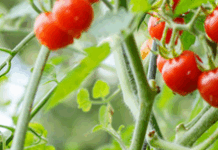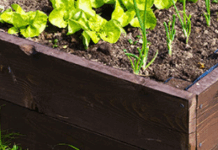K-State horticulture expert gets you ready for planting this year’s crop
MANHATTAN, Kan. – It’s still nearly three months before Kansas gardeners begin to put tomato plants into the ground. Kansas State University horticulture expert Ward Upham says that’s an opportunity for gardeners to set themselves up for a bountiful season.
“Most of the varieties available to home gardeners are either indeterminate or semi-determinate,” Upham said.
Indeterminate plants are traditional tomatoes that never stop growing. They are capable of producing fruit throughout the season unless disease stops production or frost kills the plant.
Semi-determinate plants are more compact, but also are capable of producing fruit throughout the season. Another classification is known as determinate, or those varieties that produce one large crop but then virtually nothing afterwards.
“Gardeners with limited space will likely prefer indeterminate or semi-determinate types to stretch out the harvest season,” Upham said. “If there is space, you may want to grow a combination of all three, with the determinates used to produce a large harvest for canning or tomato juice, and the remainder for fresh eating.”
In Kansas, tomatoes are generally planted in early- to mid-May, or when daytime temperatures are above 70 degrees Fahrenheit and the state has passed the frost-free date. In some areas, such as the northwest part of the state, conditions might not be right for planting tomatoes until the middle of May or a bit later, according to Upham.
Even though indeterminate and semi-determinate varieties produce fruit throughout the season, “our hot Kansas summers often cause a dry spell in production in both types,” Upham said.
Tomatoes are less likely to set fruit when night temperatures remain above 75 F and day temperatures are above 95 F. Hot, dry winds make the situation worse, Upham said.
Tomato trials
Each year, Kansas Master Gardeners plant and rate a number of tomato varieties. Upham noted that a subsequent trial is conducted by a colleague with the University of Missouri extension service.
Results of trials conducted by Kansas’ Master Gardeners vary by county. Interested persons are encouraged to contact their local extension office for more information on varieties that perform well in their area.
Upham said the University of Missouri trials also give valuable information on varieties that perform well in this region. The data from Missouri’s extension service showed that the top 10 varieties (based on pounds of fruit harvested per plant) are:
• Anna Russian.
• Cherokee Purple.
• German Johnson.
• Beef Master.
• Early Girl.
• Big Boy.
• Brandywine Black.
• Jet Start.
• Celebrity.
• Big Beef.
More information on growing tomatoes and many other topics are available in the weekly Horticulture Newsletter, produced by Upham and his colleagues in K-State’s Department of Horticulture and Natural Resources. The newsletter is available to view online or can be delivered by email each week.
Interested persons can also send their garden- and yard-related questions to Upham at wupham@ksu.edu, or contact your local K-State Research and Extension office.
FOR PRINT PUBLICATIONS: Links used in this story
Kansas Master Gardeners, https://hnr.k-state.edu/extension/master-gardeners
K-State Horticulture Newsletter, https://hnr.k-state.edu/extension/info-center/newsletters/index.html
K-State Research and Extension local offices, www.ksre.k-state.edu/about/stateandareamaps.html
K State Research and Extension is a short name for the Kansas State University Agricultural Experiment Station and Cooperative Extension Service, a program designed to generate and distribute useful knowledge for the well being of Kansans. Supported by county, state, federal and private funds, the program has county extension offices, experiment fields, area extension offices and regional research centers statewide. Its headquarters is on the K State campus in Manhattan. For more information, visit www.ksre.ksu.edu. K-State Research and Extension is an equal opportunity provider and employer.
Story by:
Pat Melgares
785-532-1160
melgares@ksu.edu
For more information:
Ward Upham
785-532-6173
wupham@ksu.edu





